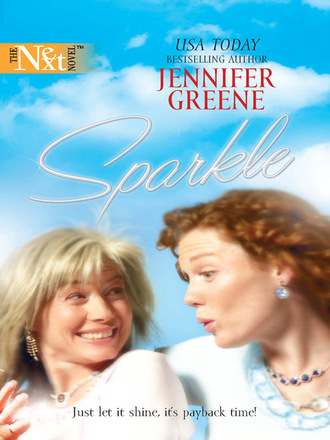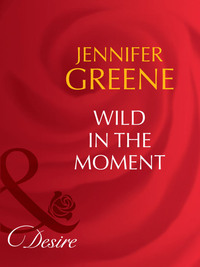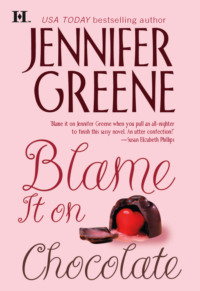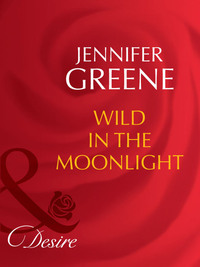
Полная версия
Sparkle
The only slight problem was that most dogs couldn’t be coaxed into doing it until she got in the water with them. She didn’t exactly mind. But ten minutes into the session with Bubba, she was wetter and stinkier than he was—and that wasn’t too complimentary, considering how much stinky hound was in Bubba’s genetic heritage.
Web stopped by a few minutes later but just to chortle in the doorway. “Tell me again—who’s that exercise pool for, you or the dog?”
She ignored the insult. She was used to it. “Look how good he’s doing!”
Web stepped in then and hunkered down at the dog’s level to watch how Bubba moved in the water. “I never thought this was going to work when you made me build the damn thing,” he admitted.
“I don’t know why you keep doubting me. I’ve told you and told you that I’m always right.” Though she easily teased him back, Web wasn’t on her mind. The dog was. Damn, but the old love was able to move with so much more ease in the water. Bubba was even wagging his tail—which contributed mightily to Poppy and the floor being extra wet, but it wasn’t as if she gave a damn about irrelevant stuff like that anyway.
“You have a helluva gift, Poppy,” Web murmured seriously.
Sometimes she thought she did. Animals made so much more sense to her than people. A critter never stood you up and rejected you or made you feel like dirt. Give an animal love, they gave back.
When she glanced up, Web had gone back to his other patients. She did the same, finishing with Bubba, then taking on a Jack Russell named Sergeant. Sergeant’s owner had been bringing him in weekly for grooming. The dog didn’t need grooming, he needed training. But since his owner couldn’t face up to admitting failure, Poppy called it “grooming” and just did the job.
Sergeant was smarter than most men—not that that was any exceptional accomplishment—and he took pleasure in testing all the humans in his realm to the far reaches of their patience whenever possible.
Poppy could outpatience him with no sweat, but she was whipped when her hour with him was over. By then it was two o’clock, and she was close to death from starvation.
If anyone had asked, she’d have claimed that the box locked in her car trunk hadn’t given her a moment’s worry. But it had. She yanked on a clean long-sleeved T-shirt, because she was too disreputable to be seen in public—even by her own loose standards.
Then she drove back into town, taking Willow Street, past all the blue-and-silver banners at the high school, past Pete’s Pharmacy and Clunkers Shoe Store and Baby Buttercup Clothes for Tots. Link’s was next, one of her favorite takeouts because it had great fresh deli.
She was still munching on a pastrami-on-rye when she pulled into the parking lot next door, behind Ruby’s Rubies. The name was hokey, but the owner’s last name was actually Ruby, so it wasn’t his fault. And of the three jewelry stores in town, everyone seemed to inherently know that Ruby’s was the best.
That wasn’t why she’d chosen the place, though. Anonymity was. One of her younger brothers was a sheriff deputy and the other volunteered with the fire department—which meant they heard all the Righteous gossip almost before a juicy story could even happen. When Poppy wanted to do something on the Q.T., she had to be sneaky enough to slip under their radar.
She was already known here, although heaven knew, not because she’d ever purchased any jewelry.
She popped in the front door, the box under her arm. The bells jangled over the door, but initially she saw no one and called out, “Hey, Ruby!”
Ruby was a one of a kind. Agewise, he had to be somewhere between forty and a hundred. He had a nose so hooked it could have caught fish, hair that streamed down his back in wiry strings and quiet gray eyes. He’d never cracked a smile that Poppy had ever seen, but he had a framed photograph over his door. It said Nature’s Most Savage Predator and showed a five-week-old orange-striped kitten peeking fearlessly over the side of a wicker basket.
Poppy had met Ruby when he’d brought the kitten in to the vet for the first time. She’d seen how he acted with the baby. Didn’t have to know him better than that to know he was a trustworthy kind of guy.
His store, though, was an alien planet. Two rows of counters gleamed with baubles and glitter. Lots of watches. Lots of wedding rings. Lots of rainbow-colored junk to dazzle the eye. Poppy heard a woman’s voice in the back room and realized Ruby must have a customer back there—but before she could duck out the door, he suddenly showed up in the workroom doorway.
She opened her mouth to say what she needed, when he simply said, “Come on back,” as if he already knew.
He couldn’t, but she really didn’t want to display the contents in the public front of the store anyway, so she trailed him into the back room. And then lifted her eyebrows in surprise.
Bren Price was already there. Her jewelry goodies were spilled out on a velvet scarf, where Ruby had obviously been studying her pieces.
“I had to know, too,” Bren said as if they’d been carrying on a conversation.
“I can do this via separate appointments if you want,” Ruby said in his deep, quiet baritone. “But I’m guessing you both have similar kinds of questions. I can do a short, cursory appraisal for you both right now—at least, if we’re not interrupted by customers.”
“I don’t know what questions either of us have. But I’m okay with your handling us together, if that’s all right with Bren,” Poppy said frankly.
“It’s all right with me,” Bren affirmed.
After that, neither woman spoke for quite a while. Poppy figured she wasn’t that surprised to find Bren there. They were both women, after all.
No female alive could survive a major dose of curiosity indefinitely. Although Poppy couldn’t believe this could possibly be a serious financial legacy—and probably neither did Bren—she just plain had to know what all that gaudy jewelry was worth so she could put her curiosity at ease.
Clearly Ruby had been working for some time on Bren’s cache of sparklers, because there was stuff all around him—paper, pencil, a monocle, some kind of fancy microscope. Once he went back to concentrating, Poppy could see a pattern emerge. He kept looking at the jewelry, then his instruments, then Bren. “Jesus,” he said.
And then, “Jesus,” he repeated.
By the time he spun his stool to Poppy’s stash and dived into her mother lode, he seemed to have that mantra down pat. The only variance in his vocabulary seemed to be an occasional, “Jesus, Mother and Mary.”
Poppy asked once, “How’s the Lion, Ruby?” referring to Ruby’s kitten, but he completely ignored her. Truth to tell, he didn’t seem to give a particular hoot if either woman was in the room.
That didn’t bother Poppy, but even for an irreverent antichurch person like herself, his choice of words started to get to her. Eventually she had to interrupt. “Look, I couldn’t care less if you use four-letter words until the cows come home, but you know Bren’s a minister’s wife, right? I mean, I realize she isn’t objecting, but I’d think…”
He just whispered, “Jesus,” again in an awe-filled tone, as if the two women weren’t even there.
A customer came in—all of them heard the bell—but Ruby jogged out to the storefront, said something, ushered the customer out and hung up his Closed sign.
In Righteous, no one turned down customers. Business was never that good.
“All right,” Poppy said finally, “you’re scaring me, assuming you aren’t scaring Bren. I sure as hell don’t want to interrupt your concentration. The sooner this gets done the better. But if you could just give us some idea what’s going on here…?”
He couldn’t be rushed. Poppy kept looking at her watch. Bren kept looking at hers.
Finally Ruby lurched off his stool and stood up, knuckling the ache at the small of his back as he gave them the bad news. He started with Bren, going through the handfuls of jewelry piece by piece. “Now all these beads here, they likely came from a five-and-dime at best. But then you see the yellow one? This one? That’s a blond diamond.”
“I never heard of a blond diamond.”
“That’s because most folks in these parts don’t tend to shop on Fifth Avenue. And you see this brooch?”
“The one with all those rhinestones and the strange peach stone shaped like a tongue?”
The brooch in question was Bren’s, but Poppy leaned closer to get a look, too. It was almost as ugly as the stuff in her hoard. The weird pink stone really did look like an animal’s tongue hanging out.
“That ain’t a tongue,” Ruby said. “It’s a conch pearl. And those rhinestones are diamonds. I need some time, but at first guess I believe that brooch is worth somewhere near a hundred grand.”
“Excuse me?” Bren’s voice was as faint as a mile-away whisper.
“A hundred thousand dollars.”
“Excuse me?”
“Then there are these long earrings here. The ones with the pink tourmaline and black gold and peridots and diamonds and all…” He held up the trashy, flashy things. “I can’t give you an exact price until I’ve studied ’em more, but off the cuff I’d say they’re worth in the ballpark of fifty grand.”
“Excuse me?”
Ruby said to Poppy, “You best get her a chair before she falls over.”
Poppy went chasing after another stool. As an afterthought, she rolled a third stool over from the back of the store for herself.
Bren plunked down on hers, looking as pale as if she’d been stung by a wasp and was experiencing the first waves of shock.
“We’ll give her a minute to breathe,” Ruby said to Poppy and then started playing with her stash. “I can’t say I care for this particular pin. It’s as big as a padlock, for Pete’s sake. Just don’t know where a woman could wear it. But the platinum and diamonds are something else. I never seen anything like her. I’m not committing it to paper until I’ve studied it more, but don’t think there’s any question we’re talking around a hundred and fifty grand.”
“Say what?” Poppy said.
“And this cuff bracelet. Lots of those little stones are just chips, nothing that’s gonna save the farm, so to speak, but those two big stones at the end are kunzite. Good kunzite. Don’t know much about the stone, but anybody can see they’re really good quality. I’d throw out twenty-five thousand for an initial guess.”
“Say what?”
“The tanzanite beaded necklace, now, isn’t quite as good as you’d think—”
“Trust me, Ruby, I’m not thinking.”
“I’m just saying. People know of tanzanite being rare, so they generally assume it’s more valuable than it is, when tanzanite is too soft a stone for a lot of applications. This one’s in a protected setting, though. It’s all right. Good stones. An interesting piece, but I still have to say I don’t think it’ll be worth more than ten K.”
“Say what?”
“Look, ladies. I need time with pieces like this to give you a true appraisal. And I’m not too proud to admit, I may have to consult with some other jewelers, check the market. Not like I’m regularly exposed to pieces like this. But offhand I’m guessing you each have jewelry valued somewhere in the two-hundred-thousand-dollar price range.”
CHAPTER 3
Two hundred thousand dollars. Bren stood at the gas pump, filling the church van before she headed home. Typically almost everyone stopping for gas was a face she knew, so she waved and smiled and did some chitchat. But her mind was still roller coastering up and down the mental hills of two hundred thousand dollars. Two hundred thousand dollars. Two hundred thou. Two hundred K. Two hundred grand.
Anyway you said it, it was beyond anything she’d imagined.
As a child, she’d grown up safe financially. But that was the last time she remembered not worrying about every dime and every bill.
“Hey, Mrs. Price, how you doing?” Joey greeted her when she plucked a few bills from her cracked wallet. He’d galloped out of the station to clean her windows the instant he’d seen the church van. She had to give him something.
“Doing just fine, Joey. How’s your mom? Her foot any better?”
There was no way to escape the conversation. She knew Joey and his sister, knew their mom, knew what a rough road the family had had ever since the mom had been laid up with foot surgery. She’d carted over dinners herself the first week. Charles had added prayers for them in his church sermon. People mattered more than money, so darn it, caring just couldn’t be rushed. But when Bren finally climbed back into the church van, she hoped God would forgive her—and the Virginia cops, too—because she sped out of town as fast as the old engine would let her.
Giddy euphoria danced in her pulse. She couldn’t wait to tell Charles about their good fortune. She could picture the relief on his face. Picture them sharing a moment of joy together. Picture that harsh look of stress ease on his face for the first time in months.
She wheeled through yellow lights at Willow, then Main, then wheeled left on Baker Road. She supposed it didn’t make too much sense to speed past the courthouse, then past the police and fire stations, as well. But there wasn’t a policeman in town who didn’t know her, so if one was going to do something wrong, Bren figured she might as well do it in plain sight. Past all that busy part of town, of course, was their Church of Peace.
A little neighborhood of houses clustered around their church. Maybe someone thought the area would become a bedroom community of D.C. back in the fifties, but that kind of prosperity never discovered the area. People were hanging on, raising their kids, but this side of Righteous was visibly struggling.
Their church looked as wilted as the rest of the structures. She was just a white frame building, long and narrow, with their house—the parsonage—just beyond the parking lot. Charles often used their home for different gatherings; so did she. The church basement was also huge, ample for events like bible readings and meals and craft sales and all that kind of thing. Even had an old, spotless kitchen down there. Bren had planted bushes and flowers when they could afford them, taken care that the church was always polished and spotlessly clean. So maybe it didn’t look like much on the outside, but inside it was safe and peaceful and had that warm-glow welcoming feeling.
Or it used to. Before things got so tight.
She parked at the house but hightailed it immediately toward the office at the back of the church, assuming she’d find Charles there. But no. She found nothing but dust motes dancing silently in the sunlight. The message light blinked on the answering machine. Charles’s jacket still hung on the old pine tree. A sermon in progress sat half-finished on the desk.
He must have taken off for some reason, and she wanted to head straight for the house, to check there. But first she grabbed a pen and paper and took the messages. Whenever Charles came back, he’d want to know who had called and why, and often enough, she could field questions on her own, without bothering him.
That done, she hustled toward the house, realizing with a half laugh that she was out of breath, had been probably since she’d left the jeweler’s. “Charles!” she called as she pushed open the screen door to the kitchen and then stopped abruptly.
Charles had his white shirt rolled up, hands on his hips. He swiveled around abruptly when he heard the door open. She had the impression he’d been pacing. Her heart sank fifty-seven feet—and fast—when she saw the straight-lipped, tight-jawed expression on his face.
“Where were you?” He asked it in that certain tone. The tone that claimed he had tons and tons and tons of patience and now was completely out.
She tried to calm her panicky pulse, but that particular tone always rub-burned her nerves. She couldn’t think when he was irritated with her. And though she’d always valued honesty, she heard a half-truth babble from her mouth. “I was just talking to a woman in town—”
“What woman?” he demanded, again his tone sharper than ice.
She couldn’t explain why she hedged telling him the whole truth. It’s not that she wanted to lie to him—ever, ever—but when she felt that anger coming at her, some instinct took over. She wasn’t thinking about lies or truth. She was just thinking about doing whatever she could to mollify him. “No one from the church, Charles. No one you would have felt you needed to talk to yourself. Just a woman who stopped to chat with me. I didn’t think there was a problem. I had no idea you were waiting for me—”
He yanked out a chair from the kitchen table, making a scraping noise that made her jump. She understood he wanted her to sit down, which seemed a fair idea, for them to try sitting and talking together—only Charles didn’t sit.
Once she was parked, he loomed over her and started talking in that tone again. The acid tone. The acid-angry scary-quiet tone. “I took you in when you were an orphan. You had nothing and no one, remember that? Just your dad in a hospital bed and no way to take care of him or yourself. You didn’t have a roof over your head. I still remember how beautiful you were. How lost. Seventeen, and so crippled on the inside to lose your mother and sister in the same accident. But I came through for you, didn’t I, Bren? Didn’t I?”
“Yes. I know you did. And I’ve always been grateful—”
“This is how you show me how grateful you are?” He yanked out another chair, just to make the squeaky noise again, just to vent more of that rage. Maybe just to make her jump again. “By disappearing for hours at a time?”
“But, Charles, I had no idea you needed me for anything this afternoon—”
“Right. How could you know when you didn’t even bother to ask?” He switched subjects faster than an eye blink. “I had the pastor breakfast this morning—assuming you could bother remembering. Everyone’s doing a fund-raiser for the hurricane in the south. We need to put on a fund-raiser, too. A bigger one. A lot bigger and better one than the Baptists are putting on.”
“All right.” She was thrilled to change the subject. Even though she knew that part of his anger was nerves and stress and not necessarily about her, somehow he made her feel…small. When he started ranting like that, she just wanted to sit tight with her knees together and her arms pressed at her sides and her head tucked, so that she took up the tiniest amount of space possible. It was kind of a goofy sensation. Just wanting to make herself as close to invisible as she could get.
She should be listening to her husband and working on the problem, working on and with him, instead of hiding out in some goofy mental corner. It shamed her that she wanted to disappear like a child instead of handling the real problems between them. But right then, God help her, she just wanted him to calm down and lose that icy look.
“Whatever you’ve been spending your time on, it isn’t as important as this. I want you to spearhead this fund-raiser. I need ideas for something different. Something that will really grab the community’s attention and interest. Not the same old bake sale or craft sale. Something good.”
She’d put on the last bake sales and yard sales and craft sales. All of them had brought in hefty donations, she’d thought. Just not enough to satisfy her husband. But it wasn’t his fault that times were so hard.
“Okay, I’ll be glad to,” she said.
“I want some kind of plan to discuss by dinner tonight.”
She didn’t look at her watch, didn’t dare, but thought it had to be already past three. Charles was still circling the table, finding things to thump around, but at least he’d stopped looming over her.
“Then I’ll include information about it in the sermon this Sunday, put it all together, start to get our parishioners excited about it. We need to look proactive.”
She lifted her head, feeling a spark of enthusiasm catch her now, too. “I couldn’t agree more. We should be proactive in times of trouble like this. And maybe you could put just a little less fire and brimstone in your sermon. Concentrate more on themes about coming together, on—”
God. She’d blown it again. He surged around the table faster than the lash of a whip. “Excuse me? Were your criticizing my sermons?”
“No. No, of course not, Charles. I just—”
“You think I don’t know how to write a good sermon? That I need advice how to do my job?”
“Charles…” She couldn’t maintain this razor-sharp level of anxiety. It was just too crazy. “Charles, come on. For heaven’s sake. Lately you’re angry at me for anything I say. I was just trying to make a suggestion—”
The next seconds passed in a blur. She doubted he’d heard her. He wasn’t listening; he was charging around the table toward her like an angry bull.
She saw him lift his hand. Saw his hand was folded in a fist. Saw the dark, livid color shooting up his neck.
As crazy and ridiculous as the thought was, for that second she actually believed he was going to hit her.
Her heart stopped. Not just her heart, the physical organ, but the core of her emotions suddenly seemed to go still, deep down. She felt as if something died, some feeling, some hope, nothing she could name…yet the sense of loss was as real as her own pulse.
“Oh, for God’s sake,” Charles said abruptly. He lowered his arm, dropped that fist. Then said nothing else, just stormed out the back door. The screen door slapped behind him.
Bren sat statue-still for a few more minutes…until the oddest thing happened. She saw a vague silhouette of a reflection in the kitchen window. It had to be a stranger, that cringing woman with the submissive bent head. It couldn’t be her. How could it possibly be her?
For that brief second she felt like a stranger in her own life.
But then, of course, she got a grip. Stood. Started dinner, started brainstorming fund-raising events.
Charles was going to be terribly upset and apologetic when he came to his senses, realized how mean he’d been to her. She was sure of it.
Three evenings later, it was pouring buckets when Bren turned the key on Maude Rose’s apartment. The place was on Willow, with a private set of stairs over Ms. Lady Lingerie and Clunkers. Everyone knew there were apartments above the retail shops, but who ever thought about them? Until she’d known Maude Rose, she’d never considered what those apartments looked like or who lived in them.
A naked lightbulb illuminated the dingy stairs—not enough to make the lock easy to see. Once inside Maude’s door, she fumbled around the wall for a switch. Lightning crackled just as she located the overhead. Slowly she slipped off her damp jacket, startled at her first look at the place.
Charles often spent one night a month in Charlestown with elders of the church, a prayer retreat sort of thing with a dozen other pastors. It never crossed Bren’s mind to check out the apartment until he’d been on the road. Then the impulse hit. There was no one to question or argue with her if she chose to come here tonight.
For the first time since she could remember, she had a completely private spot to think. Maybe that was part of what had spurred the impulse to come here. More than that, though, she really wanted to know more about the woman who’d given her such a generous legacy—especially because Bren had no idea Maude Rose even knew she’d stood up for her now and then.
And now, as she glanced around, the first shock was discovering the pale pink living room walls. Not red, not neon, not splashy or vulgar. But a quiet, clean pastel, recently painted. As far as Bren could tell, the apartment only had a bedroom, a bathroom and then this one big L-shaped room.
The fat part of the L had windows overlooking the street below. The skinny part of the L was the kitchen and eating area. Or it had been.
Bren heard the clomp of footsteps on the noisy stairs and spun around. Hard to tell who was more surprised, her or Poppy.
“I’ll be damned. Who’d have thought we’d have the same idea on the same night?” Poppy asked wryly, but her grin was wary. “Hey, if you want the place to yourself, go for it. I can come back another time—”









